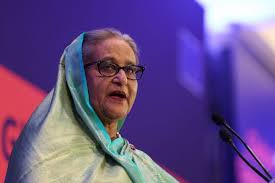
In a significant diplomatic move, Bangladesh’s interim government has requested India to send back deposed Prime Minister Sheikh Hasina, who has been living in India since August 5. The 77-year-old leader of the Awami League fled Bangladesh after widespread protests forced her out of power, ending her 16-year-long rule.
Bangladesh has sent a diplomatic note to the Indian government, seeking Hasina’s return to Dhaka to face legal proceedings. The country’s International Crimes Tribunal (ICT) has issued arrest warrants for Hasina and several of her former ministers, advisors, and military officials, accusing them of “crimes against humanity and genocide” related to past conflicts.
Touhid Hossain, the foreign affairs adviser to the interim government, confirmed the communication. “We have sent a note verbale (diplomatic message) to the Indian government saying that Bangladesh wants her back here for the judicial process,” Hossain said. Additionally, Home Advisor Jahangir Alam revealed that a formal letter had been sent to India’s Ministry of External Affairs, requesting assistance with Hasina’s extradition under an existing treaty between the two nations.
Sheikh Hasina’s exile in India has remained a source of tension between the two countries. Her stay was also discussed during a recent visit by India’s Foreign Secretary Vikram Misri to Bangladesh. Misri had a series of candid discussions with Bangladesh’s Chief Advisor, Nobel laureate Muhammad Yunus, where various bilateral issues were raised, including the state of religious minorities in Bangladesh. Misri also acknowledged concerns over Hasina’s statements made from India, which have reportedly added to the political strain.
Hasina has continued to criticize the interim government from abroad. In a virtual address to her supporters, she labeled the new regime as “fascist” and accused Yunus of being the mastermind behind the political crisis that led to the end of her government. She also condemned the increasing attacks on minority communities in Bangladesh, particularly targeting Hindus, Christians, and Buddhists.
As Bangladesh navigates its internal challenges, the diplomatic situation remains tense, with Hasina’s potential return and the legal ramifications still hanging in the balance. The outcome of this diplomatic exchange could have significant implications for the future political landscape of Bangladesh and its relationship with India.
The situation remains fluid, with both governments closely monitoring the developments. Investigations into the accusations against Hasina and her ministers continue as Bangladesh seeks justice for alleged crimes committed during her tenure in office.
Sources By Agencies




